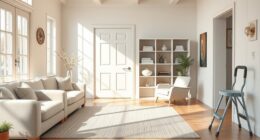To simplify home upkeep for elderly individuals, start by establishing a routine maintenance schedule and conducting regular inspections of key systems like HVAC and plumbing. Prioritize safety by decluttering spaces and engaging family or friends for support. Utilize specialized cleaning tools to ease physical strain and routinely check indoor air quality. Don't overlook exterior features or professional services for maintenance needs. Creating an emergency preparedness plan can also provide peace of mind. There's more to explore on this topic!
Key Takeaways
- Create a seasonal maintenance checklist to ensure timely inspections of home systems and simplify upkeep tasks for elderly residents.
- Utilize ergonomic and specialized cleaning tools to reduce physical strain and enhance efficiency during cleaning activities.
- Implement a "one in, one out" rule to minimize clutter and maintain a safe, organized living environment.
- Encourage family and friends to assist with home maintenance tasks, fostering community involvement and making chores more manageable.
- Schedule regular professional inspections for HVAC and plumbing systems to catch issues early and prevent costly repairs.
Establish a Routine Maintenance Schedule

While maintaining your home might seem overwhelming, establishing a routine maintenance schedule can make the process much more manageable.
Start by creating seasonal checklists that cover all your home systems, ensuring timely care and preventing major repairs. Incorporate monthly tasks like replacing HVAC filters and checking smoke alarms to enhance safety precautions.
Aim for an annual thorough inspection to assess critical home systems, which can prolong their lifespan. To stay organized, utilize a digital calendar or planner to track your maintenance tasks and their frequency.
This way, you won't overlook necessary upkeep, and you'll feel more in control of your home environment. A well-planned routine maintenance schedule keeps your space safe and efficient.
Conduct Regular Inspections of Key Systems

Regular inspections are essential for keeping your home safe and functional.
By scheduling annual check-ups on key systems, you can identify potential issues early and prevent costly repairs down the line.
Stay proactive and guarantee everything runs smoothly by making these inspections a priority.
Schedule Annual Inspections
Scheduling annual inspections of key systems in your home is essential for maintaining a safe and efficient living environment.
These inspections, focusing on HVAC, plumbing, and electrical systems, can help spot potential issues before they turn into costly repairs. By prioritizing annual inspections, you address safety concerns and guarantee compliance with local building codes, which is especially important for elderly residents.
Hiring professionals for thorough assessments assures peak performance of critical systems. Additionally, documenting findings from these inspections allows you to track repairs and maintenance over time, streamlining your home maintenance efforts.
This proactive approach not only extends the lifespan of home components but also creates a secure living space for you and your loved ones. Moreover, regular health assessments can help identify UTIs and hallucinations, ensuring the well-being of elderly residents who may experience confusion.
Identify Potential Issues Early
To keep your home safe and efficient, conducting regular inspections of key systems is vital. Create an inspection checklist that includes HVAC, plumbing, and electrical systems at least annually. This helps identify potential issues early, preventing costly repairs.
Don't forget biannual roof inspections to check for wear and leaks, and maintain gutters and downspouts every six months to prevent water accumulation and foundation problems. Monthly plumbing checks can catch leaks before they escalate into considerable damage.
Regularly test smoke alarms and carbon monoxide detectors to verify they're working properly, which greatly enhances safety. By being proactive, you'll not only help seniors avoid hazards and prevent falls but also maintain a safe living environment. Additionally, consider the importance of financial planning for assisted living as part of your overall home maintenance strategy.
Prioritize Safety With Decluttering

To prioritize safety in your home, start by removing tripping hazards like loose cords and area rugs.
Organizing essential items in labeled bins makes them easier to find, reducing confusion during daily tasks.
Simplifying your surroundings not only enhances safety but also makes decision-making less overwhelming. Additionally, reducing stress levels can further promote a safer and more comfortable living environment.
Remove Tripping Hazards
As you work to create a safer home environment for seniors, removing tripping hazards should be a top priority. Falls are a leading cause of injury among seniors, so it's essential to address potential risks.
Start by:
- Securing loose rugs with double-sided tape to prevent slipping.
- Removing or organizing electrical cords to keep pathways clear and clutter-free.
- Eliminating low furniture that could obstruct movement or cause tripping.
Regularly inspect entryways and hallways for clutter and obstacles, ensuring safe navigation.
Implement a "one in, one out" rule to maintain a tidy environment. Additionally, consider the benefits of choosing the best heat pump for temperature regulation, as maintaining a comfortable home environment can further reduce the risk of falls.
Organize Essential Items
After addressing tripping hazards, the next step is organizing essential items to enhance safety and accessibility.
Start by removing unnecessary items, which helps reduce clutter and creates a clean home environment. Dispose of expired food from the fridge and pantry to prevent illness and simplify cleaning efforts.
Use labeled clear bins for medications, organizing them by user, dose, and schedule to guarantee easy access and prevent mix-ups. Establish systems for frequently used items, making them easily accessible when needed.
Regularly assess your belongings to encourage a minimalist lifestyle, helping maintain a safe and organized space. Additionally, regular home cleaning can further support a healthier lifestyle by promoting cleanliness and hygiene.
Simplify Decision-Making Process
While decluttering may seem overwhelming at first, simplifying the decision-making process can greatly enhance safety in your home.
Start by focusing on three key areas to prevent accidents and promote easier cleaning:
- Remove Safety Hazards: Take out loose cords and unsecured rugs that can lead to falls.
- Dispose of Expired Items: Clear out expired food from your fridge and pantry to prevent illness and create a healthier living environment.
- Donate Unused Items: Identify items you no longer need and donate them, fostering a sense of accomplishment while reducing clutter.
Regularly assess your space to manage clutter accumulation. Establishing organization systems will make everything accessible, reducing frustration and enhancing your overall safety.
Engage Family and Friends for Support

Engaging family and friends in home maintenance not only lightens the load but also strengthens your support network. By encouraging loved ones to help, you can share responsibilities and help prevent overwhelming tasks.
Regular check-ins with family can guarantee proper identification of areas where you need assistance, making it easier to address cleaning, organizing, or repairs. Collaborating for seasonal chores, like yard work or gutter cleaning, can transform these tasks into enjoyable activities.
Plus, using technology, like group messaging apps, can facilitate coordination and keep everyone updated on maintenance needs. Involving family and friends not only enhances the safety and organization of your home but also fosters a sense of community and connection, making upkeep a shared effort. Additionally, incorporating digital literacy programs can help seniors feel more comfortable using technology to coordinate assistance.
Utilize Specialized Cleaning Tools

Involving family and friends in home maintenance creates a supportive atmosphere, but you can also take advantage of specialized cleaning tools to make tasks easier.
These tools are designed to reduce strain and enhance safety during your cleaning tasks. Here are three useful items to take into account:
- Lightweight vacuum cleaners: These are easy to maneuver and perfect for seniors who may struggle with heavier models.
- Grabber tools: They help you pick up items without bending or overreaching, promoting safety and reducing strain.
- Electric mops: These minimize physical effort while ensuring your floors stay hygienic. Regular maintenance with lightweight vacuum cleaners can significantly improve indoor air quality and carpet longevity.
Perform Seasonal Upkeep Tasks

As the seasons change, it's crucial to tackle specific upkeep tasks to keep your home safe and comfortable.
In spring, focus on cleaning and inspecting for winter damage, while in winter, prepare by insulating pipes and gathering emergency supplies. Additionally, consider implementing home security systems to further enhance your safety and protect your property.
Staying on top of these seasonal chores not only protects your home but also enhances your peace of mind.
Spring Cleaning Essentials
Spring cleaning is essential for maintaining a healthy and comfortable home. By dedicating time to this seasonal task, you can enhance air quality and guarantee safety throughout your space.
Here are three key tasks to focus on:
- Inspect and clean gutters to prevent water buildup, which can cause structural damage.
- Check your roof for wear, missing shingles, or leaks to avoid costly repairs later.
- Refresh outdoor spaces by trimming overgrown vegetation and inspecting decks for loose boards or wood rot.
Winter Preparation Checklist
Preparing your home for winter is essential to guarantee comfort and safety during the colder months.
Start your winter preparation checklist by insulating exposed pipes to prevent freezing and potential bursts.
Service your heating systems, like furnaces and boilers, to make sure they run efficiently when you need them most.
Check and replace weather stripping around windows and doors to keep drafts at bay.
Clear gutters and downspouts of debris to avoid ice dams that can lead to water damage.
Finally, stock up on emergency supplies such as flashlights, batteries, and non-perishable food.
Inspect and Maintain Exterior Features

To keep your home safe and functional, regularly inspecting and maintaining exterior features is essential. This proactive approach helps prevent costly repairs and enhances safety.
Here are three key areas to focus on:
- Roof: Inspect biannually for wear, missing shingles, and leaks to avoid structural damage.
- Driveways and Walkways: Regularly assess for cracks and uneven surfaces. Addressing these issues promptly can prevent tripping hazards.
- Gutters and Downspouts: Maintain clear pathways for water to flow, preventing accumulation that can lead to foundation problems.
Ensure Proper Indoor Air Quality

Maintaining a safe and functional home goes beyond the exterior; indoor air quality plays an essential role in your overall health and comfort.
To improve this, start by regularly checking and replacing your HVAC filters every 1-3 months. This helps reduce allergens and enhance air circulation.
Make certain to ventilate high-humidity areas like bathrooms and kitchens to prevent mold growth. Using air purifiers with HEPA filters can also capture airborne particles, boosting air quality further.
Don't forget to conduct annual inspections of gas appliances to prevent carbon monoxide leaks; verify your smoke alarms and carbon monoxide detectors are working properly.
Finally, keep your space clean by regularly dusting and vacuuming with a HEPA filter vacuum to minimize irritants.
Seek Professional Services When Needed

While it might be tempting to tackle home maintenance tasks on your own, seeking professional services can greatly enhance your safety and comfort. For seniors, professional help can make a significant difference in managing home upkeep.
Consider these options:
- Regular Inspections: Licensed plumbers or roofers can spot issues before they worsen, protecting your home's integrity.
- Scheduled Maintenance: HVAC technicians and electricians can identify potential problems early, preventing costly repairs down the line.
- Cleaning Services: Hiring professionals for cleaning tasks can reduce physical strain, allowing you to enjoy a tidy, organized living space.
Don't hesitate to reach out to community programs like Rebuilding Together for tailored support.
Prioritizing professional help guarantees a safer, more accessible home for you.
Create an Emergency Preparedness Plan

Creating an emergency preparedness plan is vital for ensuring your safety and peace of mind in unforeseen situations. You need to make an emergency plan that outlines actions for various scenarios like fires or medical emergencies. Here's a quick overview to help you:
| Emergency | Actions to Take | Supplies Needed |
|---|---|---|
| Fire | Evacuate immediately | Emergency kit, flashlight |
| Flood | Move to higher ground | Non-perishable food, water |
| Medical Emergency | Call 911, provide first aid | Medications, first aid kit |
Assemble an emergency kit with essential supplies and keep it accessible. Regularly review and practice your emergency plan with everyone, ensuring they're familiar with safe evacuation routes.
Frequently Asked Questions
How to Make Cleaning Easier for the Elderly?
To make cleaning easier for the elderly, start by using lightweight and robotic vacuums to reduce strain.
Establish a daily tidying routine to keep clutter at bay.
Invest in ergonomic tools like extendable dusters and electric mops, which help you clean without overexerting yourself.
Guarantee clear pathways and wear non-slip shoes for safety.
Finally, consider collaborating with family or hiring a cleaning service to lighten the load and keep your home tidy.
What Is Normal Maintenance on a House?
Did you know that regular home maintenance can save homeowners up to 30% on repair costs?
Normal maintenance on a house includes inspecting major systems like plumbing and HVAC to catch issues early. You should change HVAC filters every 1-3 months, clean gutters seasonally, and check weather stripping to prevent water damage.
Regularly inspecting siding and windows not only protects your home but also boosts its curb appeal.
Don't forget an annual thorough inspection!
How to Keep the Elderly Safe at Home?
To keep the elderly safe at home, start by removing trip hazards like loose rugs and clutter.
Install grab bars in bathrooms for extra support and check thresholds between rooms to secure them.
Consider using medical alert devices for quick emergency access.
Make home modifications such as adding ramps and using lever handles for doors.
Finally, create a room-by-room safety checklist to spot and address potential hazards tailored to their needs.
How Can I Help My Elderly Clean My House?
To help your elderly loved one clean their house, start by decluttering to eliminate trip hazards like loose cords and rugs.
Use lightweight, ergonomic cleaning tools to make tasks easier.
Create a regular cleaning schedule that includes daily tidying and weekly deep cleaning, allowing them to participate in decisions about what to keep or donate.
If needed, consider hiring professional cleaners for heavier tasks, ensuring their space stays safe and comfortable.
Conclusion
By following these expert-recommended maintenance tips, you can make home upkeep for the elderly much simpler and safer. Did you know that nearly 50% of older adults experience falls at home, often due to preventable hazards? By prioritizing safety through decluttering and regular inspections, you can greatly reduce these risks. Remember, a little proactive maintenance goes a long way in ensuring a comfortable and secure living environment for your loved ones. Additionally, implementing essential maintenance tips for caregivers can significantly enhance the quality of life for elderly individuals. Simple adjustments like ensuring proper lighting, securing loose rugs, and installing grab bars in bathrooms can prevent accidents and promote independence. Regularly checking smoke detectors and keeping emergency contacts easily accessible can further provide peace of mind for both caregivers and their loved ones.









